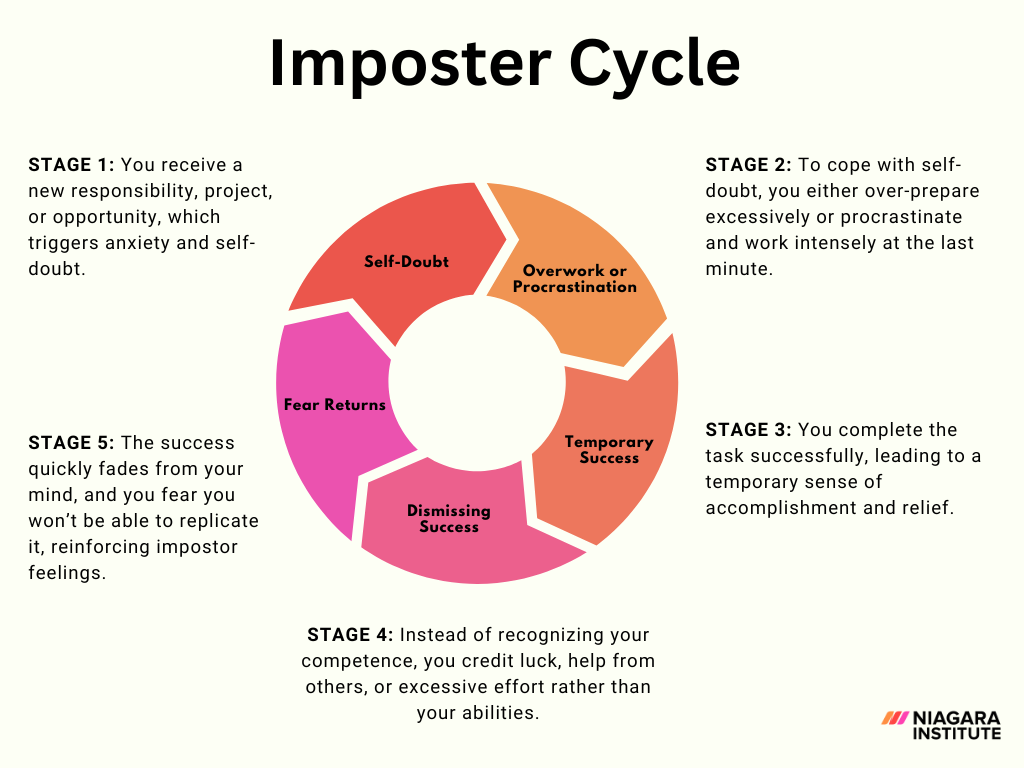Do you ever feel like a fraud at work despite your achievements? You're not alone. Imposter syndrome affects up to 70% of professionals at some point in their careers.
This comprehensive guide will help you understand, identify, and overcome those persistent feelings of self-doubt and inadequacy that can hold back even the most talented individuals in the workplace.
Do You Experience Imposter Syndrome at Work?
Have you ever:
- Not applied for a new job because you didn't think you were qualified?
- Needing to ask someone more senior than you for help but didn't want to waste their time?
- Set a higher bar for yourself than you do for your direct reports?
- Thought that you're going to be “found out” and not good enough to be in your role?
- Felt anxious in speaking up because you felt like you don't “know enough”?
If you answered "yes" to several of these questions, you might be experiencing imposter syndrome. That nagging voice whispering you're a fraud is hard enough to deal with, but carrying this emotional burden while trying to advance your career can be particularly challenging.
What is Impostor Syndrome?
Imposter syndrome at work makes you question your skills and achievements, leaving you with the nagging feeling that you don’t truly deserve your role. Even with consistent accomplishments and positive feedback, you may still fear being exposed as unqualified, leading to stress and self-doubt.

Imposter syndrome can affect even the most accomplished professionals.
In the workplace, imposter syndrome can manifest as:
- Overworking: Putting in excessive hours to "prove" your worth
- Perfectionism: Being excessively hard on yourself for even minor mistakes
- Reluctance to speak up: Staying quiet in meetings for fear of saying something "wrong"
- Difficulty accepting praise: Dismissing compliments about your work
- Fear-based decision making: Making career choices from fear rather than pursuing aspirations
- Hesitation to take action: Procrastinating on important tasks due to fear of failure
Imposter syndrome isn't about actual incompetence—it's about perception. Although it feels like reality to those experiencing it, it's fundamentally a disconnect between your achievements and how you perceive them.
Why High Performers Are Prone to Imposter Syndrome
Ironically, imposter syndrome frequently affects high achievers and leaders. This happens because:
- High performers often compare themselves to other exceptional individuals
- Leaders may try to emulate what they think others expect of them rather than being authentic
- Those committed to personal growth and excellence are more likely to notice gaps in their knowledge
- Success can increase visibility and pressure, amplifying self-doubt
The greatest paradox is that imposter syndrome can become a self-fulfilling prophecy. When you believe you're not intelligent, capable, or creative enough, you may unconsciously act in ways that reinforce those beliefs. Yet the opposite is equally true: believing in yourself can unlock new possibilities and reshape your perception of what you can achieve.
The “Impostor Cycle”: How Self-Doubt Perpetuates Itself
Dr. Pauline Clance was one of the original psychologists who founded this social experience and gave it a name “the impostor cycle.”
Her cycle identifies the combination of excessively high personal standards and critical self-evaluations that perpetuate these feelings:
- Assignment/Challenge: A new task or responsibility triggers anxiety and self-doubt
- Reaction: This anxiety leads to either:
- Over-preparation and excessive work
- Procrastination followed by last-minute intensive effort
- Temporary relief: Completing the task brings brief satisfaction
- Dismissal of success: Accomplishments are attributed to luck, extraordinary effort, or help from others—not ability
- Reinforced beliefs: The cycle strengthens the belief that you'll be "found out" next time

The 4 P's of Imposter Syndrome in the Workplace
According to Clare Josa, author of "Ditching Imposter Syndrome," there are four primary ways imposter syndrome manifests in the workplace. Understanding these patterns can help you identify your own tendencies:
1. Perfectionism
Those experiencing perfectionism-based imposter syndrome operate on the belief that "my best is never good enough." While colleagues see consistently high-quality work, the individual is constantly:
- Nitpicking their own performance
- Endlessly tweaking projects before submission
- Revisiting completed work to make "improvements"
- Over-delivering beyond what's required
This can frustrate team members and lead to burnout due to unsustainable standards.
2. Procrastination
Procrastination might look like laziness or poor time management, but with imposter syndrome, it's actually a defense mechanism. By waiting until the last minute to start work:
- You create a built-in excuse if the result isn't perfect ("I didn't have enough time")
- You temporarily numb the fear of failure or rejection
- You avoid fully engaging with the task that triggers your insecurity
This pattern creates unnecessary stress and often results in work that doesn't reflect your true capabilities.
3. Project Paralysis
Perhaps the least recognized but most debilitating manifestation, project paralysis occurs when someone:
- Becomes unable to make decisions without extensive approval from others
- Gets stuck in endless research or preparation phases
- Cannot move projects forward due to fear of making mistakes
- Constantly seeks consensus before taking even small actions
This pattern particularly impacts leadership roles, where decisive action is often necessary.
4. People Pleasing
The most common of the four patterns, people pleasing manifests as:
- Reluctance to speak up in meetings
- Hesitation to provide feedback, especially to superiors
- Avoiding disagreement with group consensus
- Taking on unreasonable demands at personal expense
- Prioritizing others' needs over your own professional development
This behavior can damage your credibility as a manager and lead to burnout.
Root Causes: Why Does Imposter Syndrome Occur?
Understanding the origins of imposter syndrome can help address it more effectively. Common causes include:
Family and Upbringing Factors
- Growing up with high expectations or critical parents
- Family emphasis on achievement above all else
- Inconsistent praise or recognition during childhood
- Being frequently compared to siblings or other children
Social and Environmental Factors
- Perfectionism: Setting extremely high standards for yourself that no one could realistically meet
- Social comparison: Constantly comparing your behind-the-scenes to others' highlight reels, especially on social media
- New challenges: Starting a new job, receiving a promotion, or entering a challenging work environment
- Workplace culture: Environments that reward overwork or emphasize competition over collaboration
- Underrepresentation: Being part of a minority group in your workplace
Personal Psychological Factors
- Tendency toward self-criticism
- Anxiety or fear of failure
- Black-and-white thinking patterns
- Difficulty internalizing success
The Real Impact: How Imposter Syndrome Affects Your Career
Imposter syndrome doesn't just feel bad—it can have tangible impacts on your professional trajectory and wellbeing:
Career Advancement
- Missed opportunities: Not applying for jobs or promotions you're qualified for
- Stagnation: Avoiding new roles and responsibilities for fear of being "found out"
- Underearning: Not negotiating salary or asking for deserved raises
Professional Performance
- Burnout: Continually overworking to "prove" your worth leads to exhaustion
- Reduced creativity: Fear of judgment restricts innovative thinking
- Communication issues: Hesitancy to share ideas or contribute in meetings
Mental Health
- Chronic anxiety: Constant worry about performance and evaluation
- Depression: Ongoing feelings of inadequacy can lead to deeper mental health issues
- Decreased job satisfaction: Inability to enjoy achievements or take pride in work
Why Imposter Syndrome Often Emerges at Work
The workplace is particularly fertile ground for imposter syndrome because:
- Evaluation is constant: Regular performance reviews and visible results make comparison unavoidable
- Stakes feel high: Financial security and professional identity are on the line
- Power dynamics exist: Hierarchies can amplify feelings of inadequacy
- Expertise is valued: Many workplaces reward perceived competence and confidence
Imposter syndrome appears when we tell ourselves we need to control our environments to avoid feeling inadequate. This control manifests as unrealistic expectations:
- "I must be the best in every meeting..."
- "I cannot make any mistakes..."
- "I need to know everything about my field..."
- "I must achieve X before I can call myself a 'real' professional..."
- "I have to impress everyone to be seen as competent..."
These thoughts often stem from internalized family or societal values that require surpassing certain thresholds to feel worthy of acceptance. Media and cultural traditions reinforce these ideals, creating impossible standards.
As people enter the workforce, they're suddenly exposed to a broader world of comparison. Without psychological safety, these comparisons can diminish confidence in the ability to self-manage and set appropriate career goals.
10 Proven Strategies to Overcome Imposter Syndrome at Work
Conquering imposter syndrome requires consistent effort and practice. Here are evidence-based strategies to help you reclaim your confidence:
1. Recognize and Name Your Thoughts
The first step is simply acknowledging when imposter syndrome appears. When you notice self-doubt emerging:
- Label it: "This is imposter syndrome talking, not reality"
- Remember this is a common experience shared by many successful people
- Understand these feelings don't reflect your actual abilities
2. Separate Feelings from Facts
Practice distinguishing between emotional reactions and objective reality:
- When you think "I'm not smart enough for this project," ask yourself, "What evidence supports or contradicts this belief?"
- Consider what you'd say to a friend expressing the same doubts
- Look for objective measures of your performance rather than relying on feelings
3. Document Your Achievements
Create a concrete record of your successes to counter self-doubt:
- Keep a "success journal" recording accomplishments, big and small
- Save emails containing positive feedback from colleagues and clients
- Track completed projects and their outcomes
- Review this evidence regularly, especially before challenging situations
4. Reframe Your Thoughts
Challenge negative thinking patterns by consciously replacing them:
- Instead of "I got lucky," try "I was prepared for this opportunity"
- Replace "I'm going to fail" with "This is challenging, but I have the skills to figure it out"
- Shift from "I don't belong here" to "I offer a unique perspective that adds value"
5. Build Your Expertise Strategically
Targeted skill development can boost confidence:
- Identify specific areas where you feel insecure and focus on building competence there
- Take courses, attend workshops, or read books in your field
- Join professional associations where you can learn from peers
- Remember that expertise develops over time—no one knows everything
6. Adopt a Growth Mindset
To develop growth mindset, understand that abilities can be developed through dedication and hard work:
- View challenges as opportunities to learn rather than tests of your worth
- Add "yet" to your vocabulary: "I don't know how to do this—yet"
- Focus on the process of improvement rather than achieving perfection
7. Seek Constructive Feedback
Constructive feedback provides an external perspective on your capabilities:
- Ask specific questions about your performance to get actionable insights
- Actively listen without defensiveness
- Use feedback to guide your development rather than validate fears
- Collect both positive and constructive feedback to gain a balanced view
8. Find a Mentor or Coach
Guidance from someone experienced can provide perspective:
- Seek out someone who has faced similar challenges
- Be vulnerable about your struggles with imposter feelings
- Learn from their experiences overcoming self-doubt
- Use their feedback to calibrate your self-assessment
9. Build a Support Network
Connect with others who can offer encouragement:
- Share your feelings with trusted colleagues—you'll likely find they relate
- Create a "confidence circle" of peers who boost each other
- Participate in professional communities where you can share challenges
- Consider professional counseling if imposter syndrome significantly impacts your wellbeing
10. Practice Self-Compassion
Treat yourself with the same kindness you would offer others:
- Acknowledge that making mistakes is part of being human
- Recognize that perfection is impossible for anyone
- Speak to yourself with encouragement rather than criticism
- Celebrate progress and small victories along the way
- Develop a can-do attitude that embraces challenges
How Leaders and Managers Can Help Combat Imposter Syndrome
If you manage others, you can create an environment that reduces imposter syndrome:
Create Psychological Safety
- Foster a culture where mistakes are viewed as learning opportunities
- Make it safe for team members to ask questions and admit uncertainty
- Avoid punishing failure when people take appropriate risks
- Model vulnerability by sharing your own challenges and learning moments
Provide Clear Feedback
- Offer specific, timely feedback on both strengths and growth areas
- Acknowledge and celebrate team members' achievements
- Frame constructive feedback as opportunities for development
- Ensure performance expectations are clear and realistic
Support Professional Development
- Provide opportunities for skill building and growth
- Match assignments to individuals' strengths while offering stretch opportunities
- Create mentoring programs within your organization
- Recognize and utilize each team member's unique contributions
Frequently Asked Questions About Imposter Syndrome
What are the 5 types of imposter syndrome?
While Clare Josa identifies the 4 P's (perfectionism, procrastination, project paralysis, and people-pleasing), psychologist Dr. Valerie Young outlines five types of imposter syndrome:
- The Perfectionist: Focuses on "how" things are done and sets extremely high standards
- The Expert: Believes they should know everything before proceeding with a task or project
- The Natural Genius: Expects mastery on the first try and feels shame when learning is required
- The Soloist: Feels asking for help reveals inadequacy
- The Superhuman: Pushes to excel in every role simultaneously (worker, parent, friend, etc.)
Identifying your type can help you address specific thought patterns that fuel your imposter syndrome.
How do I know if I have imposter syndrome?
Common signs of imposter syndrome include:
- Attributing success to external factors like luck or timing rather than your abilities
- Difficulty accepting compliments about your work
- Fear of being "found out" or exposed as a fraud
- Setting excessively high standards for yourself
- Feeling you must know everything before starting a project
- Discounting your expertise even with evidence of competence
- Overworking to compensate for perceived inadequacies
If these feelings persist despite evidence of your competence, you may be experiencing imposter syndrome.
What is the root cause of imposter syndrome?
Imposter syndrome doesn't have a single cause, but common contributing factors include:
- Family dynamics: Growing up with high expectations or inconsistent validation
- Personality traits: Tendencies toward perfectionism or anxiety
- New challenges: Experiencing major transitions or increased responsibilities
- Social conditioning: Messages about what success should look like
- Workplace culture: Environments that reward overwork or emphasize competition
- Underrepresentation: Being part of a minority group in your field
Often, it's a combination of these factors rather than a single cause that creates the perfect conditions for imposter syndrome to develop.
Should I tell my boss I have imposter syndrome?
This depends on your relationship with your manager and your workplace culture. Consider these factors:
- Trust level: Do you have an open, supportive relationship with your manager?
- Company culture: Is vulnerability viewed as a strength or weakness in your workplace?
- Framing: How will you present the information? Focus on growth rather than limitations
If you decide to share, consider framing it as: "I'm working on building confidence in X area" or "I'd appreciate feedback on Y to help me develop my skills further." This approach shows self-awareness and a commitment to growth rather than focusing solely on self-doubt.
Does imposter syndrome ever go away completely?
For many people, imposter syndrome doesn't disappear entirely but becomes more manageable over time. Instead of elimination, the goal is often to:
- Recognize imposter feelings when they arise
- Develop strategies to prevent these feelings from controlling decisions
- Build resilience to bounce back quicker when self-doubt emerges
- Use these feelings as signals that you're challenging yourself and growing
Many highly successful individuals report occasional imposter feelings throughout their careers, especially when taking on new challenges—but they've learned to work with these feelings rather than be paralyzed by them.
Is imposter syndrome linked to ADHD or anxiety?
Research suggests that people with ADHD or anxiety disorders may be more susceptible to imposter syndrome:
- ADHD connection: The challenges of working memory, organization, and time management that come with ADHD can create disparities between effort and results, leading to self-doubt
- Anxiety connection: Generalized anxiety disorders can amplify normal workplace worries into persistent imposter feelings
If you have ADHD or anxiety, working with healthcare professionals to manage these conditions may also help reduce imposter syndrome symptoms. Cognitive-behavioral therapy (CBT) has shown effectiveness for both conditions and can address imposter feelings as well.
From Imposter to Empowered
Imposter syndrome is a challenge, but it's one that can be overcome with self-awareness, practice, and the right tools. By understanding its roots and actively working to counteract its effects, you can boost your confidence, improve your performance, and find greater satisfaction in your professional life.
Remember that feeling like an imposter doesn't mean you are one. Your achievements are real, your contributions matter, and you have earned your place at the table. With practice and persistence, you can quiet that inner critic and fully embrace your capabilities and worth in the workplace.
After all, the most successful people aren't those who never experience self-doubt—they're the ones who learn to move forward despite it. You've earned your place where you are—it's time to own it.
 Gavin Brown
:
Feb 17, 2025 6:49:02 AM
Gavin Brown
:
Feb 17, 2025 6:49:02 AM




.png)
